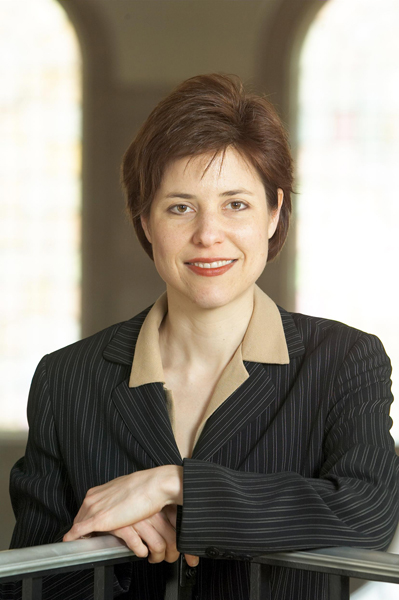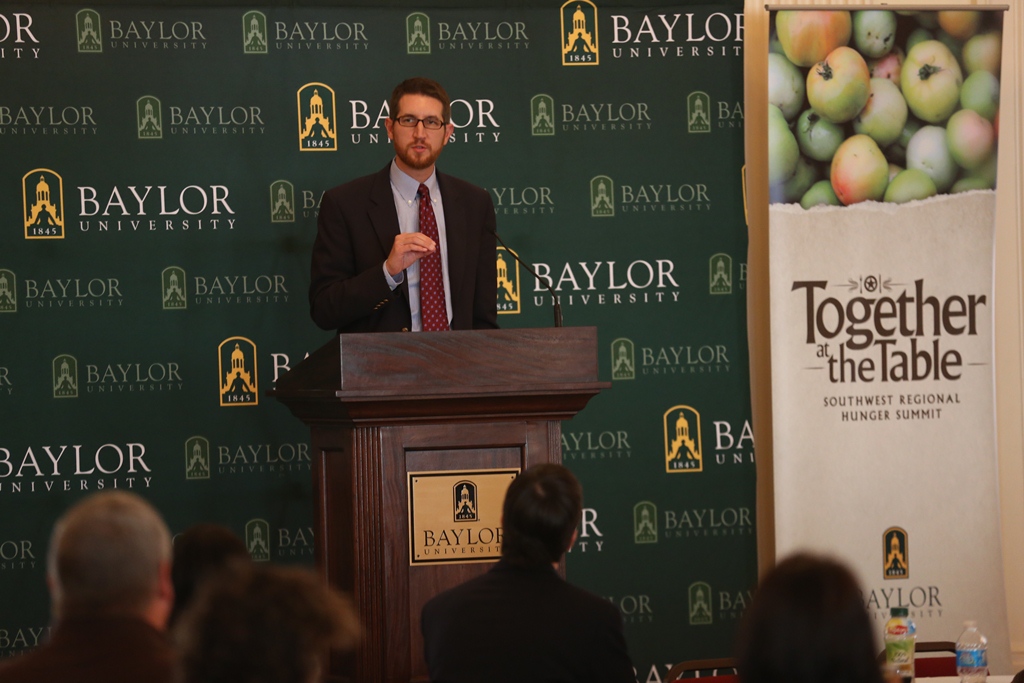Hunger Summit Brings White House Representative, Anti-Hunger Leaders To Baylor for 'Together at the Table' Hunger Summit


Follow us on Twitter: @BaylorUMediaCom
Contact: Lori Fogleman, (254) 710-6275
Melissa Rogers, executive director of the White House Office of Faith-Based and Neighborhood Partnerships, will keynote Friday's luncheon on the Baylor campus
WACO, Texas (Oct. 21, 2013) -- Melissa Rogers, Special Assistant to the President and executive director of the White House Office of Faith-Based and Neighborhood Partnerships, and Audrey Rowe, administrator of Food and Nutrition Service (FNS) for the USDA in Washington, D.C., will be among the keynote speakers at the annual "Together at the Table: Hunger Summit" Oct. 24-25 at Baylor University.
The summit is hosted by the Texas Hunger Initiative (THI), a statewide anti-hunger organization developed within the Baylor School of Social Work, in partnership with the United States Department of Agriculture (USDA). The two-day meeting provides an opportunity for leaders and practitioners from across the country to share their knowledge and expertise about food insecurity and the eventual goal of ending hunger.
"What I'm most excited about with this year's summit is that we're bringing an academic community alongside the corporate sector, the faith-based sector and the nonprofit community to look at ways that we can move toward evidence-based models," said Jeremy Everett, director of the Texas Hunger Initiative. "By moving toward evidence-based practices, we know we'll get a higher return on our collective investment in terms of feeding more children and adults across the country in ways that build community and strengthen low-income families' ability to move toward financial independence."
Melissa Rogers, remarks at 12:45 p.m. Friday, Oct. 25, Fifth Floor, Cashion Academic Center
Melissa Rogers will give her presentation at 12:45 p.m. during a luncheon that begins at 11:45 a.m. Friday, Oct. 25, in Room 510 on the fifth floor of the Cashion Academic Center, 1401 S. Fourth St. (NOTE TO MEDIA: To attend Rogers' presentation, media are asked to check in at the registration table on the fifth floor. An area for TV cameras with access to an audio multbox will be available at the back of the room facing the stage. Please contact Lori Fogleman with additional questions, 254-710-6275 or Lori_Fogleman@baylor.edu.)
In 2009, President Barack Obama appointed Rogers to serve as chair of his inaugural Advisory Council on Faith-Based and Neighborhood Partnerships. In 2011, she was named to a subgroup of the State Department's Religion and Foreign Policy Working Group. In 2013, she was appointed by the President as director of the White House Office of Faith-Based and Neighborhood Partnerships. Rogers has testified before subcommittees of the U.S. Senate and House Judiciary Committees. She graduated Phi Beta Kappa from Baylor in 1988 and earned her law degree from the University of Pennsylvania Law School in 1991.
Rogers formerly served as director of the Center for Religion and Public Affairs at Wake Forest University Divinity School and as a nonresident Senior Fellow in the Governance Studies program of The Brookings Institution. Prior to her time with Wake Forest and Brookings, Rogers was executive director of the Pew Forum on Religion and Public Life and General Counsel of the Baptist Joint Committee for Religious Liberty.
"We're very excited that Special Assistant to the President and Baylor alumna Melissa Rogers will be here, in particular, because of her role with the federal government. Her job is to bring all of the different sectors together to deal with significant problems facing our nation today, and we see no bigger problem facing our nation today than the problem of poverty," Everett said. "Melissa will be able to give us strategic insights on things the White House is doing to improve the ways that we address hunger and poverty across all sectors."
Audrey Rowe, remarks at 6:45 p.m. Thursday, Oct. 24, Fifth Floor, Cashion Academic Center
Audrey Rowe will give her presentation at 6:45 p.m. during a session and dinner from 5:15 p.m. to 7:15 p.m. Thursday, Oct. 24, in Room 510 on the fifth floor of the Cashion Academic Center, 1401 S. Fourth St. (NOTE TO MEDIA: To attend Rowe's presentation, media are asked to check in at the registration table on the fifth floor. An area for TV cameras with access to an audio multbox will be available at the back of the room facing the stage. Please contact Lori Fogleman with additional questions, 254-710-6275 or Lori_Fogleman@baylor.edu.)
Rowe has extensive experience working on issues related to FNS programs. Most recently, she served as deputy administrator for Special Nutrition Programs at FNS, leading the effort to pass the Healthy, Hunger-Free Kids Act of 2010, the legislative centerpiece of First Lady Michelle Obama's Let's Move! initiative to end childhood obesity in a generation.
"We're also very pleased that USDA administrator Audrey Rowe will be in attendance at this year's Summit. She brings a unique perspective in that she oversees all nutrition programs for the federal government in her role with USDA," Everett said. "Audrey will be able to highlight instances where best practices are happening across the country."
Anti-hunger organizations and advocacy groups from around the country can choose from more than 40 Breakout Sessions and panels to attend during the two-day summit. Attendees will include representatives from hunger-relief alliances, food banks, school districts, congregations, state departments and academic institutions, among other organizations.
More than 70 speakers and panelists from across the country will lead these sessions, which encourage interaction among attendees who can share best practices and learn from others' experiences in the fight to end hunger.
This summit will focus on proven methods to move the needle on hunger, be it through increasing participation in child nutrition assistance programs such as the National School Breakfast Program or creating local food planning associations to truly address the challenges and barriers in a certain community. Other breakout session topics include senior hunger, food banks, state policy, federal policy, congregational outreach and urban gardening, to name a few. See the complete list of Hunger Summit breakout session topics and abstracts here.
Texas, National Food Insecurity
Nationwide, USDA and Feeding America statistics show that more than 50 million Americans are food insecure. Texas itself has the third-highest rate of "food insecurity" in the nation, with one in five Texas households hungry or at risk of hunger between 2010 and 2012, according to a USDA report released in September. Additionally, Texas has the second largest number of children living in food-insecure households, especially when they are not in school. Also, six of the top 10 counties with the highest rate of childhood food insecurity in the country are in Texas.
These issues are not unique to Texas, and many states share similar unsettling statistics. However, unlike other challenges associated with poverty, hunger can be solved and the necessary funding - and infrastructure in many cases - already exists to do so, according to Everett. Low participation in nutrition assistance programs often means that states miss out on millions of dollars in federal funding that they desperately need.
"The USDA is committed to helping alleviate hunger through the use of federal nutrition assistance programs and partnerships with organizations such as THI," said Bill Ludwig, USDA Food and Nutrition Service Southwest Regional Administrator. "In a region with high rates of food insecurity, it is especially important for advocates to work together to create, share and implement strategies to end hunger."
The "Together at the Table: Hunger Summit" is sponsored by ConAgra, Dairy MAX, Kellogg's and Walmart. For more information about THI and the Hunger Summit, visit www.baylor.edu/texashunger.
ABOUT BAYLOR UNIVERSITY
Baylor University is a private Christian university and a nationally ranked research institution, characterized as having "high research activity" by the Carnegie Foundation for the Advancement of Teaching. The university provides a vibrant campus community for approximately 15,000 students by blending interdisciplinary research with an international reputation for educational excellence and a faculty commitment to teaching and scholarship. Chartered in 1845 by the Republic of Texas through the efforts of Baptist pioneers, Baylor is the oldest continually operating university in Texas. Located in Waco, Baylor welcomes students from all 50 states and more than 80 countries to study a broad range of degrees among its 11 nationally recognized academic divisions. Baylor sponsors 19 varsity athletic teams and is a founding member of the Big 12 Conference.
ABOUT THE BAYLOR SCHOOL OF SOCIAL WORK
The Baylor University School of Social Work is home to one of the leading graduate social work programs in the nation with a research agenda focused on the integration of faith and practice. Upholding its mission of preparing social workers in a Christian context for worldwide service and leadership, the School offers a baccalaureate degree (BSW), a Master of Social Work (MSW) degree, a PhD degree, and three joint-degree options (MSW/Master of Business Administration, MSW/Master of Divinity and MSW/Master of Theological Studies) through a partnership with Baylor's Hankamer School of Business and George W. Truett Theological Seminary. Visit www.baylor.edu/social_work to learn more.
ABOUT THE TEXAS HUNGER INITIATIVE
The Texas Hunger Initiative (THI) is a collaborative, capacity-building project, housed in the Baylor University School of Social Work, which develops and implements strategies to end hunger through research, policy, education, community organizing and community development. THI seeks to make the state food secure by ensuring that every individual has access to three healthy meals a day, seven days a week. THI convenes federal, state and local government stakeholders with non-profits, faith communities and business leaders to create an efficient system of accountability that increases food security in Texas. Along with its Central Office located within the Baylor University School of Social Work, THI has 12 regional offices located in Amarillo, Austin, Dallas, El Paso, Fort Worth, Houston, Lubbock, McAllen, San Angelo, San Antonio, Tyler and Waco.